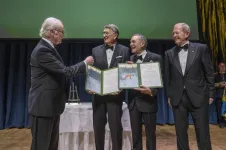(Press-News.org) Waiting for two minutes or longer to clamp the umbilical cord of a premature baby soon after birth could help reduce the risk of death, compared with immediately clamping the umbilical cord, or waiting a shorter time before doing so. Delaying clamping could decrease the child's risk of death by more than half relative to immediate clamping.
The new findings, published today in two companion papers in The Lancet, examined clinical trial data and outcomes of thousands of premature babies which had delayed cord clamping compared to those whose cord was clamped immediately after birth.
Delaying clamping of the umbilical cord allows blood to flow from the placenta to the baby whilst the baby’s lungs fill with air. This is thought to help ease the transition to breathing in the infant.
“Worldwide, almost 13 million babies are born prematurely each year and, sadly, close to 1 million die shortly after birth. Our new findings are the best evidence to date that waiting to clamp the umbilical cord can help save the lives of some premature babies,” says first author Dr Anna Lene Seidler at the NHMRC Clinical Trials Centre, University of Sydney.
“We are already working with international guideline developers to make sure these results are reflected in updated guidelines and clinical practice in the near future.”
Delayed cord clamping is now recommended routine practice for babies born at full term. However, whilst previous research , including trials led by University of Sydney, showed potential benefit for premature babies, best practice for this vulnerable group remained uncertain. Until recently, clinicians generally cut the cord of preterm babies immediately so urgent medical care could be given.
These uncertainties have led to different recommendations in national and international guidelines.
For instance, for preterm infants not requiring resuscitation at birth, the Australian and New Zealand Committee on Resuscitation (ANZCOR) suggest delaying cord clamping for at least 30 seconds.
The World Health Organization and the UK’s National Institute for Health and Care Excellence (NICE) recommend delayed umbilical cord clamping (not earlier than 1 min after birth) for improved maternal and infant health and nutrition outcomes.
For preterm babies requiring resuscitation, the WHO recommends immediate clamping, while ANZCOR make no recommendation due to insufficient evidence.
Largest delayed cord clamping dataset to date
The studies were the result of a massive global effort (the iCOMP collaboration) among more than 100 international researchers on umbilical cord management, who shared their original data with Dr Seidler and her team for analysis, including the large APTS trial led out of the University of Sydney.
This created one of the largest databases in this research field, with over 60 studies and including more than 9000 babies.
The first paper using data from 3,292 infants across 20 studies found delayed clamping of the umbilical cord, clamped 30 seconds or more after birth, likely reduced the risk of death in premature babies by a third compared to those whose umbilical cord was clamped immediately after birth.
In a subgroup of premature babies where infants were born before 32 weeks of pregnancy, 44.9 percent of the babies with immediate cord clamping experienced hypothermia after birth, compared to 51.2 percent of those with delayed clamping. The average difference in temperature between the deferred clamping group and the immediate clamping group was -0.13 °C.
“Our findings highlight that particular care should be taken to keep premature babies warm when deferring umbilical cord clamping. This could be done by drying and wrapping the baby with the cord intact, and then by placing the dry baby directly on the mother’s bare chest under a blanket, or using bedside warming trollies,” says Prof Lisa Askie, senior author of the study from the NHMRC Clinical Trials Centre.
The second paper analysed data from 47 clinical trials, which involved 6,094 babies, and found waiting at least two minutes before clamping the cord of a premature baby may reduce the risk of death compared with waiting less time to clamp the cord.
In comparing different timings, waiting two or more minutes to clamp the cord had a 91 percent probability of being the best treatment to prevent death shortly after birth.
Immediate clamping had a very low (<1%) probability of being the best treatment for preventing death.
“Until recently, it was standard practice to clamp the umbilical cord immediately after birth for premature babies so they could be dried, wrapped, and if necessary, resuscitated with ease,” says Dr Sol Libesman, lead statistician for this study and research fellow at the NHMRC Clinical Trials Centre.
“Our study shows that there is no longer a case for immediate clamping and, instead, presently available evidence suggests that deferring cord clamping for at least two minutes is likely the best cord management strategy to reduce the risk of premature babies dying shortly after birth.”
However, the researchers highlight situations where more research is needed on cord clamping. This includes when there are babies requiring immediate resuscitation, unless the hospital is able to provide safe initial breathing help with the cord intact, or in a low-income setting with limited medical resources.
“We need further research into how to best provide immediate care to the sickest premature babies while the cord is intact. Even for healthier premature babies, it may seem counter-intuitive to some doctors to defer cord clamping when the baby requires care, but with appropriate training and equipment, along with a full team approach involving midwives, doctors and parents, it is possible to successfully defer cord clamping whilst ensuring the baby is warm, breathing, and cared for,” says Dr Seidler.
END
Delaying cord clamping could halve risk of death in premature babies
2023-11-15
ELSE PRESS RELEASES FROM THIS DATE:
Richard Haynes receives Marcus Wallenberg Prize for development of forest economic model
2023-11-15
Richard Haynes, a former research forester and program manager at the USDA Forest Service Pacific Northwest Research Station, received the 2023 Marcus Wallenberg Prize at a ceremony in Stockholm, Sweden. Awarded annually, the international prize is bestowed by the King of Sweden in recognition of scientific achievements that contribute to forestry and forest industries.
Haynes was recognized for his work developing the Timber Assessment Market Model (TAMM), a spatial model that projects volumes and prices in the solidwood products and sawtimber stumpage ...
Increased threat of war enhances pup survival
2023-11-15
Animal offspring may survive better when their groups are in greater conflict with rival factions, research from the University of Bristol has shown for the first time.
Battles between competing groups can lead to serious injury or death and intergroup conflict has always been thought to have a negative effect on reproductive success.
But findings published today in the Proceedings of the Royal Society B turn that long-held belief on its head.
Using a decade of life-history data from a wild population of dwarf mongooses, University of Bristol researchers found that ...
How COVID-19 compromised U.S. gains in controlling HIV
2023-11-15
The COVID-19 pandemic slowed previous gains made in controlling HIV blood levels and worsened health disparities, according to UC Francisco researchers leading the largest U.S. evaluation of the impact of the public health crisis on people with HIV.
While the country had been making progress on its goals to reduce HIV before COVID-19, the researchers found the pandemic compromised those gains by leveling off improvements in the overall population and worsening outcomes among Black patients and people who inject illicit drugs.
“Equity in HIV outcomes likely worsened during the pandemic, with decreased ...
Texas A&M professor published in leading history journal
2023-11-15
Dr. Sonia Hernández, professor in the Department of History at Texas A&M University, has published an article in the September issue of the Journal of American History, the leading scholarly publication in the field of American history and the official academic journal of the Organization of American Historians.
Her article, titled "Gendering Transnational State Violence: Intertwined Histories of Intrigue and Injustice along the U.S.-Mexican Borderlands, 1900-1913,” ...
US men die 6 years before women, as life expectancy gap widens
2023-11-14
We’ve known for more than a century that women outlive men. But new research led by UC San Francisco and Harvard T.H. Chan School of Public Health shows that, at least in the United States, the gap has been widening for more than a decade. The trend is being driven by the COVID-19 pandemic and the opioid overdose epidemic, among other factors.
In a research paper, published Nov. 13, 2023, in JAMA Internal Medicine, the authors found the difference between how long American men and women live increased to 5.8 years in 2021, the largest it’s been since 1996. This ...
Microplastics come from everywhere – yes, from sex toys too
2023-11-14
As more research reveals how many microplastic particles humans are ingesting and absorbing in their bloodstreams, Duke and Appalachian State researchers led by Joana Sipe and Christine Hendren have examined a source for microplastic absorption many would not have considered: sex toys. In a study originally published in Microplastics and Nanoplastics in March 2023, researchers will discuss the risks of sex toys at the 2023 Society for Risk Analysis Annual Conference. The majority of American adults report having used sex toys, which, ...
Disrupting a single gene could improve CAR T cell immunotherapy, new study shows
2023-11-14
CAR T cell therapy, a powerful type of immunotherapy, has begun to revolutionize cancer treatment. Pioneered at Memorial Sloan Kettering Cancer Center (MSK), the therapy involves engineering a patient’s T cells so they recognize and attack cancer cells. These CAR (chimeric antigen receptor) T cells are then multiplied in a lab and given back to the patient to be a continual fighting force against the cancer.
New research from the lab of physician-scientist Michel Sadelain, MD, PhD, shows that disrupting a single ...
UIUC professors receive AFOSR grant to study detrimental defects in superconducting qubit junctions
2023-11-14
University of Illinois Urbana-Champaign professors Angela Kou (Physics), Pinshane Huang (MatSE), Wolfgang Pfaff (Physics) and Andre Schleife (MatSE) have received an Air Force Office of Scientific Research grant for their project “Identifying the origin and lossy defects in Josephson junctions”. The two-year, nearly $1 million grant aims to take a materials science approach to address the detrimental defects of Josephson junctions in superconducting qubits.
The current state of quantum computing is called the noisy intermediate-scale quantum ...
Mirvie announces completion of enrollment of 10,000 person landmark research study for pregnancy health
2023-11-14
South San Francisco, CA (November 14, 2023) – Mirvie, a company pioneering the prediction of life-threatening pregnancy complications months in advance, today announced the completion of enrollment of its landmark 10,000 person research study for pregnancy health, in collaboration with leading experts in obstetrics and maternal-fetal medicine.
“This monumental effort represents a new chapter for pregnancy health,” said Maneesh Jain, CEO and co-founder of Mirvie. “Today, we face a massive crisis in maternal health, and innovative solutions are desperately needed. The audacious scale of this generalizable study – involving over 10,000 individuals – ...
Study finds strongest evidence yet for local sources of cosmic ray electrons
2023-11-14
A new study using data from the CALorimetric Electron Telescope (CALET) instrument on the International Space Station has found evidence for nearby, young sources of cosmic ray electrons, contributing to a greater understanding of how the galaxy functions as a whole.
The study included more than seven million data points representing particles arriving at CALET’s detector since 2015, and CALET’s ability to detect electrons at the highest energies is unique. As a result, the data includes more electrons at high energies than any previous work. That makes the statistical analysis of the data more robust and lends support to the conclusion that there are one or more local ...




